高中英语必修5Unit1UnitoneReading
Unit 5 Reading and thinking 知识点课件-高中英语人教版必修第一册

单句语法填空
(3) Despite what others say,he thinks it is worth reading.
(4) Although/Though what others say annoyed him, he
still carried out the plan.
2.【教材原文】It dates back several thousand years to the
business一般指公事、正事或商业事务。
考点二
appreciate vt.欣赏;重视;感激;领会 vi.增值
appreciate sb’s/one’s doing sth 感激/感谢某人做某事
I would appreciate it if... 假如……我将不胜感激。
学以致用
用affair,matter,event,business的适当形式填空
( 角色
(6)There is a serious side to her character.( 性格 )
(7)The whole character of the school has changed since a
new teaching method is introduced.( 特色 )
a variety of/varieties of 多种多样的;形形色色的
vary vi.变化;不同
various adj.各种不同的;各种各样的
考点二
character n.文字;符号;角色;品质;特点
语境领悟
(1)Mr Brown doesn’t know Chinese characters.
useful but inexpensive things.
新课标高中英语必修5 课文翻译与要点 unit1
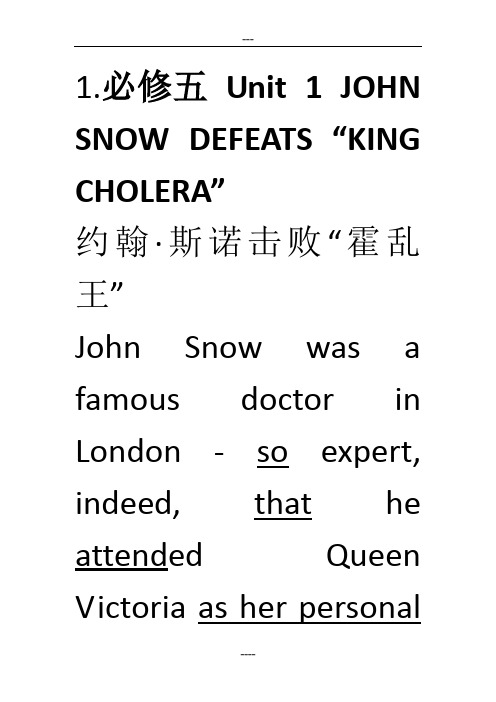
1.必修五Unit 1 JOHN SNOW DEFEATS “KING CHOLERA”约翰·斯诺击败“霍乱王”John Snow was a famous doctor in London - so expert, indeed, that he attended Queen Victoria as her personalphysician.约翰·斯诺是伦敦一位著名的医生——他的确医术精湛,因而成为照料维多利亚女王的私人医生。
But he became inspired when he thought about helping ordinary people exposed to cholera.但他一想到要帮助那些得了霍乱的普通百姓时,他就感到很振奋。
This was the deadly disease of its day.霍乱在当时是最致命的疾病,Neither its cause nor its cure was understood.人们既不知道它的病源,也不了解它的治疗方法。
So many thousands of terrified people diedevery time there was an outbreak.每次霍乱暴发时,就有大批惊恐的老百姓死去。
John Snow wanted to face the challenge and solve this problem.约翰·斯诺想面对这个挑战,解决这个问题。
He knew that cholera would never be controlled until itscause was found.他知道,在找到病源之前,霍乱疫情是无法控制的。
He became interested in two theories that possibly explained how cholera killed people.斯诺对霍乱致人死地的两种推测都很感兴趣。
牛津译林版高中英语必修5Unit 1Getting along with othersReading课件148张PPT课件ppt
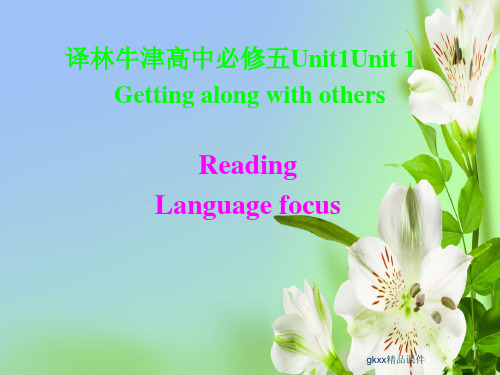
1. We have been good friends since primary
school. (line7)
(prep.)
(1). Unemployment in that country is now at its lowest level since WWII.该国的失业率 处于二战以来的最低水平。
2). I write not just for the pay, but for fun.(乐趣). We had a lot of fun at the party.
3). They often make fun of me for this.
gkxx精品课件
Don’t make_____of the blind man. A. fun B. funs C. funny D. a fun fun 做名词时不可数, 不能与a连用,也没 有复数形式。
park.
我们想要一
个能居高临下看到花园而不是停车场的房
间。
gkxx精品课件
6.I was determined to be cheerful.(line14)
(1) adj. 下了决心的
a. He is determined to take part in the international speech competition.
gkxx精品课件
(2). may have done (it’s not certain) Something may have happened to her. 可能她发生了什么事。
4. feel like (have a desire for) (line11-12)
gkxx精品课件
人教版高中英语必修5_unit_1_单词讲解
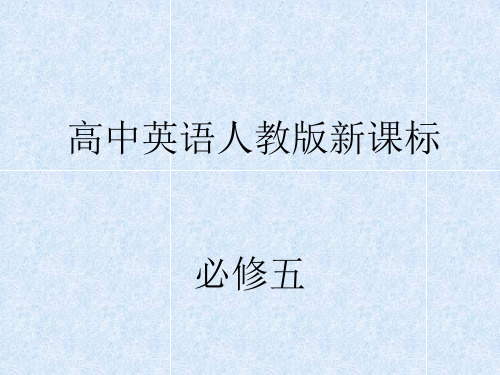
10. expose vt. 暴露,揭露, 使曝光 expose crime揭露罪行 expose the truth揭露真相 • expose sth./sb./oneself (to...) 暴露某事物/某 人/自己(给……) expose sb/sth 揭发某人/某事 be exposed to 暴露 expose…to…“把……暴露于……之下(之中), 使……受到……作用” expose a child to books exposed adj. 暴露的,暴露于风雨中的,无掩蔽的 exposure n. [u]暴露;揭露,揭发 expose one’s skin to the sun 使皮肤暴露于阳光下
• take part in 指参加会议或群众性活动等, 着重说明句子主语参加该项活动并在活动中 发挥积极作用。 • We'll take part in social practice during the summer vacation. 暑假期间我们将参加社 会实践。 • take part in是惯用词组,part前一般不用冠 词,但part前有形容词修饰时,要用不定冠 词。Lincoln took an active part in polities and was strongly against slavery. 林肯积极 参加政治活动,强烈反对奴隶制。
vt. 治愈;治疗
curable adj. 可治愈的 a cure for... 针对……的治疗 cure sb. of sth. 改正某人的坏习惯;治愈某人的疾病
• 区别cure/treat/heal (1)treat指通过药物、特别的食品或运动治病,强 调治疗过程,不一定治好。
• treat sb. for sth.医治某人的病;还可作“对 待,看待”讲,treat...as把……看作/视为。 (2)cure意为“治愈,痊愈”,特别指病后的恢
新人教版高中英语必修5 Unit1_Great_Scientists (1)

3. Why is there no death at No. 20 and 21 Broad Street as well as at No. 8 and 9 Cambridge Street? These families had not drunk the water from the Broad Street pump.
Nobody knew the cause of the serious disease of cholera
Unit 1 Great Scientists
Period 1 Warming up & Pre-reading Period 2 Reading Comprehension Period 3 Reading & Listening Period 4 Learning about Language Period 5 Grammar Past Participle Period 6 Listening Period 7 Reading and Writing
It begins in the stomach and a severe case can lead to death without immediate treatment.
And the victims died very quickly from a loss of liquid after severe vomiting(呕吐) and diarrhea(腹泻).
Come on!
Skimming Who was the great scientist in the passage and what was the deadly disease of its day?
人教版高中英语必修五book5 unit1 reading知识点

11
注意:
immediately, the moment, directly, instantly 等 与 every time一样,都可以用作连词引导时间 状语从句,意为 “一…..就”。
e.g. I will give the letter to him immediately I see him.
1
1.Who put forward a theory about black holes. 谁提出了黑洞理论
put forward (1) 提出(+表示建议,计划等的名 词)= come up with
e.g. put forward a very good suggestion/plan 提出了一个很好的建议 /计划
Smith. 昨天我们看见的那个人是史密斯先生. 7
(2) expose ① 使暴露于;使接触到 expose sth/sb to 使…暴露于…;使面临;
使遭受(危险,攻击等) be exposed to 招致,遭受 翻译:呆在户内,别把你的皮肤暴露于太阳底下 Keep indoors and don’t expose your skin to the sun.
8
5.deadly (1) adj. 致命的,致死的;毒性的 e.g. This is a deadly poison. 这是一种致命的毒药。 (2) adv. ①死一般地 e.g. His face was deadly pale. 他的脸死一般地苍白。 ② 非常,极度地 e.g. The air was deadly cold. 空气极度寒冷。
(2) 把...向前拨
Unit 1 Great Scientists Reading 课件-高中英语人教新课标必修五
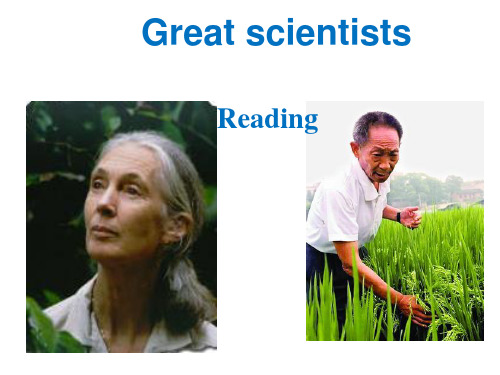
People absorbed it with their meals.
2023/1/25
(3) aiming to kill or destroy 意在杀死的; 不共戴天的: a deadly enemy 不共戴天的敌人 2)deadly adv. (1) very 极度; 非常; 十分 deadly serious 十分认真 (2) like death 死一般地
John Snow was a well-known _d_o_c_to_r_ in London in the _1_9_th__ century. He wanted to find the _c_a_u_s_e_ of cholera in order to _d_e_fe_a_t_ it. In 1854 when a cholera _b_r_o_k_e_ out, he began to gather information.
He _m__a_r_k_e_d__ on a map where all the dead people had lived and he found that many people who had drunk the dirty water from the _p_u_m__p_ died. So he decided that the polluted water carried cholera. He suggested that the _s_o_u_r_ce__ of all water supply be _e_x_a_m__in_e_d__ and new methods of _d_e_a_l_in__g_ with polluted water be found. Finally, “King Cholera” was defeated.
高中英语Unit 1 Great scientists 人教版必修五
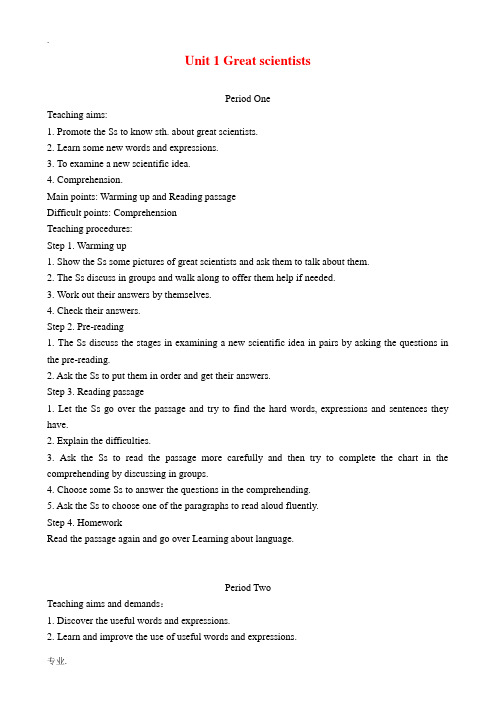
Unit 1 Great scientistsPeriod OneTeaching aims:1. Promote the Ss to know sth. about great scientists.2. Learn some new words and expressions.3. To examine a new scientific idea.4. Comprehension.Main points: Warming up and Reading passageDifficult points: ComprehensionTeaching procedures:Step 1. Warming up1. Show the Ss some pictures of great scientists and ask them to talk about them.2. The Ss discuss in groups and walk along to offer them help if needed.3. Work out their answers by themselves.4. Check their answers.Step 2. Pre-reading1. The Ss discuss the stages in examining a new scientific idea in pairs by asking the questions in the pre-reading.2. Ask the Ss to put them in order and get their answers.Step 3. Reading passage1. Let the Ss go over the passage and try to find the hard words, expressions and sentences they have.2. Explain the difficulties.3. Ask the Ss to read the passage more carefully and then try to complete the chart in the comprehending by discussing in groups.4. Choose some Ss to answer the questions in the comprehending.5. Ask the Ss to choose one of the paragraphs to read aloud fluently.Step 4. HomeworkRead the passage again and go over Learning about language.Period TwoTeaching aims and demands:1. Discover the useful words and expressions.2. Learn and improve the use of useful words and expressions.Main points: Learn to use the words and expressions that the Ss discover.Difficult points: Improve the use of the words and expressions.Teaching procedures:Step 1. Learning about language1. Discover the useful words and expressions in this unit in groups of four.2. Ask the Ss to show their results to the class.3. Ask them to study the words and expressions in Ex.1.4. Ss have a discussion and do the exercises.5. Check their answers.6. Change the verbs into nouns and make sentences by using “make a …〞Step 2. Using words and expressions1. Make sure the Ss know the words and expressions.2. Let the Ss work in groups to complete the blank in Ex.1.3. Check their answers.4. Do the translations. Ss discuss the sentences and the translate them into English, using the words and phrases in brackets.Step 3. Words learning1. Show the Ss a list of prefixes to talk about them.2. Ask them to work in groups to find some words with the prefixes and study their meanings.3. Let them show their results to the class.4. Walk around the class to give them help if needed.Step 4. Study the use and meanings of suggest1. Study the meaning of suggest by looking the dictionary entry.2. Match the meanings with the sentences on the right in Ex.4.3. Check their answers.Step 5. HomeworkTeaching aims and demands:1. Discover the useful structure.2. Learn to use the grammar of past participle.3. Enable the Ss understand the past participle using as attribute and predicative.Main points: Learn the usage of the past participle using as attribute and predicative.Difficult points: Use the useful structure.Teaching procedures:Step 1. RevisionReview the past participle of some verbs.Step 2.1. Look at the chart and study the phrases.Past participle as the attribute and the predicative(1) terrified people(2) reserved seats(3) polluted water(4) a crowded room(5) a pleased winner(6) children who look astonished(7) a vase that is broken(8) a door that is closed(9) the audience who feel tired(10) an animal that is trapped3. Ask the Ss the following questions:(1) What kind of words before the past participles?(2) What kind of words after the past participles?4. Ask the Ss find the sentences using the past participle in the reading passage.5. Ss have a discussion and complete the chart with the same meaning of the phrases above.6. Ss show their results to the class.7. Complete the sentences in Ex.3.Step 3. Using structure1. Make sure the Ss know the words and the discuss in groups to finish the sentences using past participle.(Ex.1)2. Rewrite the sentences into one sentence using the past participle as the attribute or predicative.3. Check their answers.Step 4. HomeworkWrite down 1, 3, 5, 7 of Ex.2 in the exercise book.Period FourTeaching aims and demands:1. Improve the Ss listening skills.2. Know more about great scientists.Main points: Listening and speakingDifficult points: Get to know the information of listening materials.Teaching procedures:Step 1. Listening and speaking1. Listen to the tape and answer the questions.(1) What did Qian Xuesen study first?(2) What experience did he get in America that was very useful for China?(3) What was Qian Xuesen’s achievement when he returned to China from America?(4) How has he been honoured in China?(5) How did Steve honour him?Step 2. Speaking1. Ss discuss what scientific job they will do in the future in pairs by using the questions and expressions on Page 6.2. Ask some Ss to talk in class.Step 3. Listening and talking1. Play the tape for the Ss to listen and finish the exercises in the workbook, pause from time to time if needed.2. Check their answers.3. Work in pairs. Imagine you are going to meet a specialist about a newly-found flower by using the useful sentences on Page 42.Step 4. Listening task1. Play the tape for the Ss to get the information of the listening task.2. Check their answers.Step 5. HomeworkPrepare the reading task.Period FiveTeaching aims and demands:Improve the Ss reading skills and their talent in getting the information.Main points: Reading and reading taskDifficult points: Finding the Euler path.Teaching procedures:Step 1. RevisionRevise the past participle used as the attribute and predicative.Step 2. Reading1. Ss read the passage as fast as they can and then draw the two theories of the universe in groups.2. Ask the Ss to show their pictures to the class.3. Ss read the passage again and find the problems they have.4. Solve the Ss’ problems.5. Discuss in pairs. If you were Nicolaus Copernicus, would you have hidden your theory for so many years? Why?6. Choose some Ss to share their ideas to the class.Step 3. Reading task1. Ss read the passage and answer the following questions.(1) What is odd point? (2) What is even point? (3) What rule did Euler find?2. Ss discuss in groups and try to find the answers.3. Teacher walks around to offer them help.4. Use the rule to see if you can go over the diagram, not missing any points or going over any line twice.( See figures on Page 46)5. Ss work in groups.Step 4. HomeworkWrite a short passage about Copernicus.Period SixTeaching aims and demands:1. Try to write sth persuasive.2. Learn to write a report about people.Main points:Make a plan in discussion.Difficult points:Write a passage / a report.Teaching procedures:Step 1. Writing1.Ask the Ss to read the passage again and gather some information about Copernicus.2. Plan to write a letter.Step 2. Writing taskWrite a report about your scientist, his/her life, achievements and the key to his/her success.1. Before you begin to write, remember to put your information under three headings: life, achievements and key to success.2. Plan your report like the one on P47.3. Ask them to read their plans.4. Begin to write the report.Step 3. HomeworkComplete the report and write down on the exercise book.。
- 1、下载文档前请自行甄别文档内容的完整性,平台不提供额外的编辑、内容补充、找答案等附加服务。
- 2、"仅部分预览"的文档,不可在线预览部分如存在完整性等问题,可反馈申请退款(可完整预览的文档不适用该条件!)。
- 3、如文档侵犯您的权益,请联系客服反馈,我们会尽快为您处理(人工客服工作时间:9:00-18:30)。
11
❖ 1. Are the writhers of the two letters feeling happy or sad? They're feeling sad.
❖ 2. What did sarah get for the surprise Maths test? She got a D.
整理ppt
3
❖He lives alone on the island for 15 years until a boy called Friday turns up. Crusoe stays on the island for 27 years until he and Friday are finally rescued. After he is rescued. Crusoe goes home only to realize he is very rich. He gives much of his fortune to the friends who helped him before the shipwreck.
❖Have you ever fallen out with a very good friend?
整理ppt
9
What are the possible reasons that might lead to a broken friendship?
❖1. misunderstanding ❖2. having little in common ❖3. lacking trust ❖4. there being conflict of interest ❖5. being jealous of each other's
(4) Why did Andrew shout at Matthew after the match?
(5) What did Matthew think about losing the match?
(6) What kind of boy is Matthew?
整理ppt
14
Check the answers: (1) What did Sarah think about the surprise
整理ppt
4
Can you imagine what it would be like to live on an uninhabited island?
整理ppt
5
❖How do you think he felt when he first saw Friday?
整理ppt
6
After being alone for 15 years, what do you think the most important thing for Robinson Crusoe was?
success
❖ ……
整理ppt
10
Fast reading for general information:
Read the two letters as quickly as possible and answer the questions of part A on page 2.
整理ppt
❖ 3. Is Matthew usually a quiet boy? No, he is usually cheerful and outgoing.
整理ppt
12
Careful reading for detailed information:
❖Read the two letters again more carefully and try to answer the questions of part C1
整理ppt
7
❖After hearing Robinson Crusoe's story, what do you think the most important thing in the world is?
整理ppt
8
❖Do you have a friend who means a lot to you?
Unit one Reading
● Secrets and lies ● A friendship in trouble
整理ppt
1
Are you familiar with these pictures? Can you tell the stson Crusoe is a young man who always dreams of having adventures at sea. When he is just 18, Crusoe leaves home and goes to sea. However, on one of his voyages, Crusoe becomes the only survivor of a shipwreck. He makes it to a nearby island only to fine that no one lives there.
整理ppt
13
(1) What did Sarah think about the surprise Maths test?
(2) What did Sarah tell Hannah in the girls' toilets?
(3) Why did Sarah tell Hannah that they weren't going to be friends any more?
